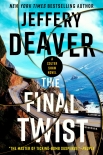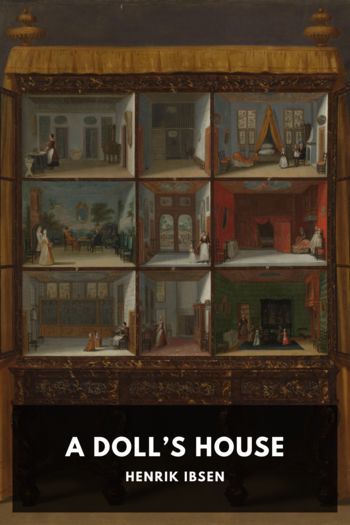The Final Twist by Jeffery Deaver (have you read this book .TXT) 📗

- Author: Jeffery Deaver
Book online «The Final Twist by Jeffery Deaver (have you read this book .TXT) 📗». Author Jeffery Deaver
“Any other crews here?” Russell asked.
“Nothing righteous. Some franchises from Salinas keep flirting with the shorefront, north. They show up, we discourage them. They go away. They come back. You know what it is. All right. I got business.” He looked at Shaw. “Tom Pepper. He was okay. Fair man. Good thing he still with us.”
Kevin returned to the social club, and the men to the SUV. “We could canvass here a week and that’s the only answer we’re ever going to get. There’s got to be a better way,” Shaw said.
“Yeah. Find the courier bag. Use it as leverage to stop BlackBridge.” Russell started the big engine.
Shaw looked out the passenger window. He saw one of the young men who’d confronted them on the street—one of the skinnier, with a shaved head. The kid stood on a pile of rubble about thirty feet away. He reached up under his burgundy hoodie as he stared toward the vehicle with a demeaning smile.
Shaw tensed and his hand went toward his hip.
Russell glanced his brother’s way.
Suddenly, the kid’s hand zipped from under the sweatshirt and, with his fingers formed like a pistol, pointed at Shaw and mimicked firing, the hand jerking back in recoil. The smile vanished. His hand tightened into a fist and the next gesture involved a single finger. He clambered down the rubble heap and vanished.
Shaw said, “Let’s pick up on Ashton’s leads. Burlingame first.”
“Put it in GPS.”
Shaw pulled out his phone, then paused as he looked over the screen. “Not yet. Braxton and Droon are on the move.”
28
The GPS tracker hidden in the spine of Henry David Thoreau’s meditation on self-sufficiency had led them back to the Tenderloin.
They were not far from where Shaw’s unexpected reward job—to locate Tessy Vasquez—had begun.
Russell parked the SUV in a spot in front of a dilapidated retail storefront, closed now. The window bills pleaded for lessees. A homeless man, wrapped in a gray blanket, slept in the doorway. A few dollar bills peeked from under the corner of his covering. Russell knelt and pushed them out of sight. Shaw had been about to do the same.
Orienting himself, glancing around the neighborhood, then at the GPS app, Shaw pointed to an alley.
The brothers declined an offer from a pale young woman in her early twenties and they stepped over another man, about the same age, unconscious and lying in the mouth of the alley. He too was presumably homeless, though his clothes were more or less clean and he didn’t have any of the accoutrements that most street people possess: bags, shopping cart, blankets, extra clothing. Was he dead?
Russell apparently caught his brother’s thought. He nudged the man’s arm with his shoe and got a reaction. Three doors away was a storefront of a community outreach service. Shaw walked to it and stepped inside. A thin man of about fifty in a clerical collar looked up and offered a pleasant smile. “Help you?”
“There’re two men, up the street, passed out. Maybe you’ve got somebody who could help. One’s drunk, I think, but the other one might’ve OD’d. Out the door to the right.”
He rose and called into the back room, “Rosie, come on and bring your bag.” He said to Shaw, “Terrible. Overdoses’re up fifty percent in the past couple months, and we’ve got a gang injunction here. I don’t know what’s going on.”
The Urban Improvement Plan is what’s going on.
Shaw returned to his brother and they proceeded down the alley, with Russell behind, checking for threats from that direction, just as Shaw did in the front. This was instinctive.
Never believe your enemies aren’t pursuing you.
At the far end of the moist, soiled passage, they found themselves on the edge of a large area—taking up several blocks—that was in the process of being cleared. Bulldozers and backhoes, their yellow and black paint jobs spattered with mud, sat unoccupied, parked in the north section of the space. The site was a mix of partially demolished buildings and vacant ground. Pits of oily standing water shimmered and modest mountains of scrap materials from the destroyed buildings dotted the landscape. The terrain was light in color, almost beige. The soil would be clay.
In the center of the flattened area sat a black SUV, a Cadillac Escalade. The GPS indicated that it was the source of the pings. Braxton probably had with her a briefcase or backpack containing the material she’d stolen from Shaw’s camper the other day, including the bugged book.
The Escalade’s doors opened and Droon, who was the driver, and Braxton climbed out. They looked around—Russell and Shaw crouched behind a pile of scrap wood and plasterboard. When they rose and looked again, the pair from BlackBridge was in a heads-down conversation. Droon was nodding.
Another car pulled in and the two BlackBridge employees looked up. It was a Rolls-Royce, dark red. The sleek vehicle eased slowly over the uneven ground and parked, side by side with the Caddie.
No doors opened.
Braxton took a phone call.
Droon stretched and lit a cigarette.
Russell took out his phone, snapped some pictures, then put it back. “Look at the tags.”
On the Rolls there was a sheet of white cardboard or plastic over the license plate. The illegal obfuscation would be only temporary; as soon as they hit the street, the driver would pause and pull off the rectangle.
Who was the visitor?
Braxton disconnected and the driver of the Rolls, a huge Asian man in a black suit, got out. He looked around, necessitating another dodge by the brothers. Then he opened the back passenger side door. The man who climbed out was of fair complexion, short, balding and round. He wore a pinstripe suit, navy blue, a pink shirt and a wide burgundy tie. A white handkerchief exploded from the breast pocket. His white-rimmed glasses were oversize and the lenses square—maybe stylish, maybe necessary for a serious vision malady. His expression suggested irritation or impatience.
Russell’s phone appeared again and





Comments (0)